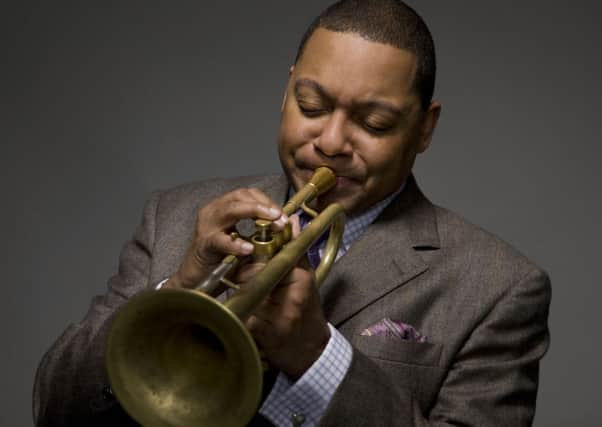Trumpeting the great gospel of jazz


MANY people only discover later on in life what it is they want to do. Wynton Marsalis knew he was going to be a musician by the time he was just eight years old.
Although given the fact he was born into a world filled with mellifluous musical notes, it perhaps comes as little less of a surprise. “My father was a musician and I grew up in New Orleans in an environment where music was everywhere,” he says. “I loved being around jazz musicians, I loved the way they talked. I liked the musicians before I even liked the music.”
Advertisement
Hide AdAdvertisement
Hide AdAlthough it wasn’t long before the music, too, held him in its thrall. At the age of eight he performed traditional New Orleans music in a church band, led by legendary banjoist Danny Barker.
It was the start of a musical career that has seen him work with some of the grandees, not only of jazz, but modern music including Dizzy Gillespie, Willie Nelson and Eric Clapton.
Jamie Cullum cited him as one of his musical inspirations saying of Marsalis: “He’s an excellent ambassador of jazz, a mentor for kids and a 21st-century Duke Ellington – nothing more, nothing less.”
Marsalis is both an adroit trumpet player and a big band leader and later this month he’s bringing this unique sound to the Royal Hall, in Harrogate, when he will be performing with the New York-based Jazz at Lincoln Center Orchestra, of which he is musical director.
Advertisement
Hide AdAdvertisement
Hide AdThe band launches its UK tour in Harrogate and the show will encompass pretty much the entire history of modern jazz from bebop to the dance floor, featuring big band arrangements of popular classics.
The concert also celebrates the 75th anniversary of the iconic American record label Blue Note, which Marsalis is signed to. Blue Note became to jazz what Sun Records was to rock ‘n’ roll.
In its early days the label was dedicated to recording more traditional jazz but after the Second World War it switched its attention more towards modern jazz, recording work by bebop pioneers such as Thelonious Monk and Fats Navarro. “Blue Note started out with Sidney Bechet’s Summertime which was their first hit and over the years they’ve recorded all kinds of jazz music, from New Orleans music to boogie woogie,” says Marsalis.
They have also had some iconic names on their label over the years including Herbie Hancock, Dexter Gordon and Art Blakey. “In the late Sixties it began working with a younger generation of musicians and it’s still going strong today.”
Advertisement
Hide AdAdvertisement
Hide AdMarsalis was brought up with jazz music and quickly gravitated towards it. “I listened to pop music and it seemed a bit superficial, I was looking for something deeper,” he says.
He not only loved jazz music but the colourful, if itinerant, life that went with it. “I went to see my father playing in these smoky clubs and I wanted to be part of this world.”
By the time he was 12 he began studying the trumpet seriously and gained experience as a young musician in local marching bands, as well as jazz groups and classical youth orchestras.
He opted for the trumpet because he’d been given one as a Christmas present by a friend of his father’s. “It could have been any instrument but it just happened to be a trumpet.”
Advertisement
Hide AdAdvertisement
Hide AdComing from a musical family he was surrounded by a constant stream of musicians, but of all those he encountered it was his father who inspired him the most.
“He believed in the music and through him I learned about life and integrity in what you do. So whether he was playing in front of six people, or 600, he played the same way and he gave it his all.
“I would watch him play and he made me believe in the power of music as a force for good, something that brings people together,” he says.
“I learned from so many great people, like John Lewis. What he taught me was unbelievable.”
Advertisement
Hide AdAdvertisement
Hide AdAnd it wasn’t just music skills either. “I used to go round to his house for lunch and play with him and his wife and there was one time I was round there complaining.
“I was angry about something that had been written about me and he stopped me and said ‘to complain about what somebody has done to you is a form of egotism, let’s rehearse,’” he says.
By the 1980s, Marsalis had established himself as one of the hottest jazz talents around and in 1983 he became the first and only artist to win both classical and jazz Grammy awards – a feat he repeated the following year.
But despite the accolades, for him it’s all about the music. “It’s an art form, it’s not like a circus trick and it’s not about trying to produce something that you think will be popular. It has a beauty and poetry and depth, it’s a music of engagement and when you hear a big band playing it shows what can be achieved by a group of musicians.”
Advertisement
Hide AdAdvertisement
Hide AdAs well as producing some of the world’s greatest soloists including Miles Davis, Charlie Parker and the incomparable Louis Armstrong, jazz has also produced some great big band music.
Today, it might not be as popular, commercially at least, as say rock, pop or dance music, but that won’t stop Marsalis and co from playing the music they love.
“We hope that people want to hear this kind of music but we’ll keep playing anyway – I learned that from my father.”
• Wynton Marsalis is appearing with the Jazz at the Lincoln Center Orchestra at the Royal Hall, Harrogate, on June 20. For tickets call the box office on 01423 562303 or visit www.harrogateinternational festivals.com